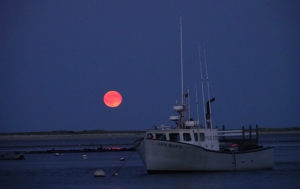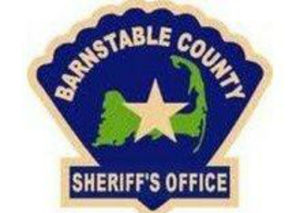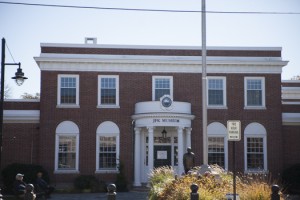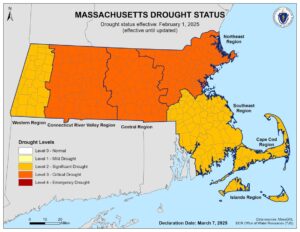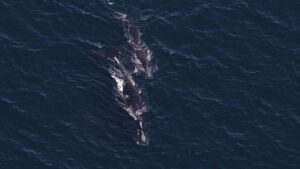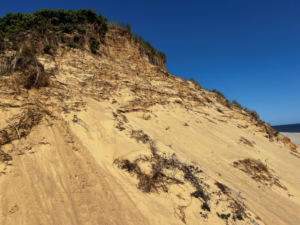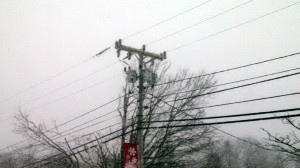 BARNSTABLE – With yet another winter storm heading toward New England, National Grid is prepared to respond to the possibility of service interruptions to electric and natural gas customers, according to a statement from the company.
BARNSTABLE – With yet another winter storm heading toward New England, National Grid is prepared to respond to the possibility of service interruptions to electric and natural gas customers, according to a statement from the company.
The National Weather Service is predicting maximum wind gusts of near hurricane force speed on Nantucket and 50 to 60 miles per hour for much of the Massachusetts North and South Shore areas, southeastern Massachusetts and most of Rhode Island. The potential also exists for some coastal flooding during Sunday morning’s high tide.
Maximum snow accumulations are expected to range from more than a foot in the eastern most portions of Massachusetts to lesser depths in central, western and southeastern areas of the Bay State and Rhode Island. The increased snowpack makes it even more important that customers clear snow from around natural gas appliance vents and ice and snow overhanging natural gas meters or service lines. Obstructed vents can cause carbon monoxide to back up into homes and businesses and ice falling on gas equipment can cause gas leaks.
“While this storm doesn’t approach the intensity of Juno, we want to be certain we have the people and resources available to deal with any service issues that may arise,” said Dan Bunszell, National Grid’s vice president of New England Electric Operations. “As always, the safety of our customers and employees is our number one priority. The combination of high winds, heavy snow and frigid temperatures means we all need to take precautions.”
The company stated that it will have more than 250 National Grid and contractor line crews and more than 80 tree crews available to handle the storm restoration effort in Massachusetts and Rhode Island from Saturday night through Sunday.
Customers Urged to Stay Safe During and After the Storm
National Grid advises customers to be prepared for service interruptions. It’s a good idea to have a number of working flashlights, at least one battery-operated radio and an extra supply of batteries in your home. National Grid offers the following tips for customers to minimize inconvenience and maximize safety in the event that storm-related power interruptions do occur.
The company offers the following tips for customers to minimize inconvenience and maximize safety in the event that storm-related power interruptions occur.
- National Grid customers who experience an outage should call National Grid at 1-800-465-1212 to expedite restoration.
- Never touch downed power lines, and always assume that any fallen lines are live electricity wires. If you see one, report it immediately to National Grid or your local emergency response organization.
- Power problems can sometimes interrupt public water supply systems or disable well pumps, so it’s an especially good idea to keep a supply of bottled drinking water handy, as well as some canned food.
- People who depend on electricity-powered life support equipment, such as a respirator, should let National Grid know. To register as a life support customer, call the company’s New England Customer Service Center at 1-800-322-3223.
- Check on elderly family members, neighbors and others who may need assistance during an outage period.
Electricity & generator safety
- If you use a generator to supply power during an outage, be sure to operate it outdoors. Before operating a generator, disconnect from National Grid’s system by shutting off the main breaker located in the electric service panel. Failure to do this could jeopardize the safety of line crews and the public.
- If you lose power, turn off any appliances that were on when the power went off, but leave one light on so you will know when power is restored.
- Remember, it’s not safe to work in an elevated bucket during periods of increased wind gusts. Our line workers begin restoration work only when conditions are deemed safe.
Gas safety
- The buildup of ice and snow around or over gas meters and vents for natural gas appliances could pose a serious safety risk. Ice and snow falling from a roof can damage gas meters or service connections to customers’ homes or businesses, resulting in a gas leak.
- Ice and snow blocking vents could cause CO to back up into a building and result in carbon monoxide poisoning for those inside.
- To avoid these dangers, National Grid advises natural gas customers to closely inspect areas around and over gas meters, service hook-ups and vents for ice and snow that could damage equipment or prevent CO from properly venting.
- National Grid advises that you take immediate action anytime you suspect a natural gas leak:
- Get Out – All occupants should leave the house immediately. Open windows to ventilate. Do not use the telephone or light switches for any reason.
- Call Us – After leaving the house and reaching a safe environment, call the National Grid 24-hour gas emergency number: Greater Boston area: 1-800-233-5325; All other areas: 1-800-548-8000
- Stay Out – Do not return to your home until National Grid tells you it is safe.
Carbon Monoxide
The symptoms of carbon monoxide poisoning are similar to those of the flu. Depending upon the amount of carbon monoxide in the air and length of exposure, symptoms may include headaches, weakness, confusion, chest tightness, skin redness, dizziness, nausea, sleepiness, fluttering of the heart or loss of muscle control.
If you suspect carbon monoxide is present in your home, go outside immediately and breathe deeply; then call 911. If symptoms are severe, get medical attention




